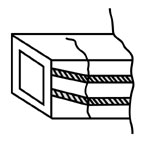| Case Name |
In the execution of the improvement of the small and medium-sized rivers, the conduit pipe becomes unstable since the design was not appropriate. |
| Pictograph |

|
| Date |
1995 |
| Place |
Yamanashi Prefecture |
| Location |
The prefectural office |
| Overview |
In the case of exchange construction of conduit pipe, the design of the conduit pipe was unappropriate and the conduit pipe itself became unstable because the bar arrangement was carried out as showed in the standard figure without carrying out the stress calculation. The government subsidy was the considerable amount of \ 6860,000 which concerned this construction, and was considered unreasonable. |
| Incident |
According to the standard design, the vertical main reinforcement in the standard figure shows the minimum amount of reinforced concrete. And, in the case of actually adopting a standard design, the vertical main reinforcement is designed individually by calculating the stress, which is based on design condition, foundation ground and length of the structure etc. However, the bar arrangement was carried out as showed in the standard figure without carrying out the stress calculation. By carrying out the stress calculation of the vertical main reinforcement of conduit pipe in this case based on that design condition, as the conduit pipe by the emission mouth side (length:27.0m), the pull stress generated to the bottom of the main reinforcement was 3916kgf/cm2 and exceeded the allowance pull stress (1600kgf/cm2). It was out of the safety range to calculate the stress. Then, the crack ( width largest 3 and 4 millimeters ) was generated over the whole circumference at 2 places of this conduit pipe and the center of the conduit pipe subsided as much as 45 millimeters. Therefore, the conduit pipe by the emission mouth side became unstable since the design was not appropriate. |
| Sequence |
* Embankment construction and exchange construction of the conduit pipe etc were carried out by government subsidies of \ 50779,000 in order to move the river levee backward with the widening of the Kamata river.
* As the design of conduit pipe, the result of satisfying the design condition of inner space cross section from box culvert construction plan was adopted, which was shown in the civil engineering structure standard design the Ministry of Construction enacted . The main reinforcement of length (water flow) derection of the conduit pipe was designed and constructed based on the standard figure.
* According to the standard design, in the case of actually adopting a standard design, the vertical main reinforcement is designed individually by calculating the stress. However, in this case,the bar arrangement was carried out as shown in the standard figure without carrying out the stress calculation.
* Therefore, the conduit pipe at the emission mouth side became unstable since the design was not appropriate. The government subsidy of the considerable amount of \ 6860,000 which concerned this construction was considered unreasonable. |
| Cause |
The designer did not read the civil engineering structure standard design carefully. By the fact that the design did not satisfy the allowable stress at all, he did not have even rough sense for the tensile force which was charged on reinforcement. |
| Countermeasures |
It is notified for the designer to carefully read the standard design well. The person with more knowledge is adopted to the designer. Or, the result is checked finally by the person who has knowledge. |
| Knowledge Comment |
To abide by the standard design absolutely |
| Scenario |
| Primary Scenario
|
Insufficient Analysis or Research, Insufficient Prior Research, Insufficient Analysis or Research, Insufficient Prior Research, Planning and Design, Poor Planning, Malfunction, Specifications Not Met, Possible Damage, Potential Hazard
|
|
| Sources |
The 1996 fiscal year settlement inspection report ( Board of Audit ).
|
| Financial Cost |
The government subsidy of the delivery amount of \ 6860,000 was considered unreasonable . |
| Multimedia Files |
Fig2.Cross sectional side view
|
|
Fig3.Hicda concept chart
|
| Field |
Civil Engineering
|
| Author |
YONEZAWA, Akio (The University of Tokyo)
KUNISHIMA, Masahiko (The University of Tokyo)
|
|